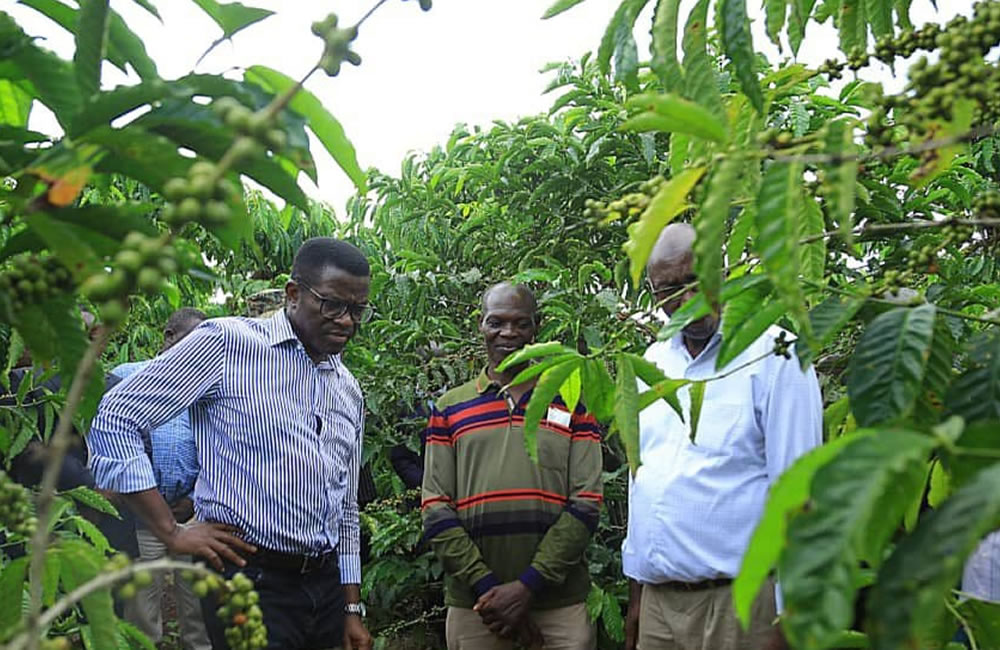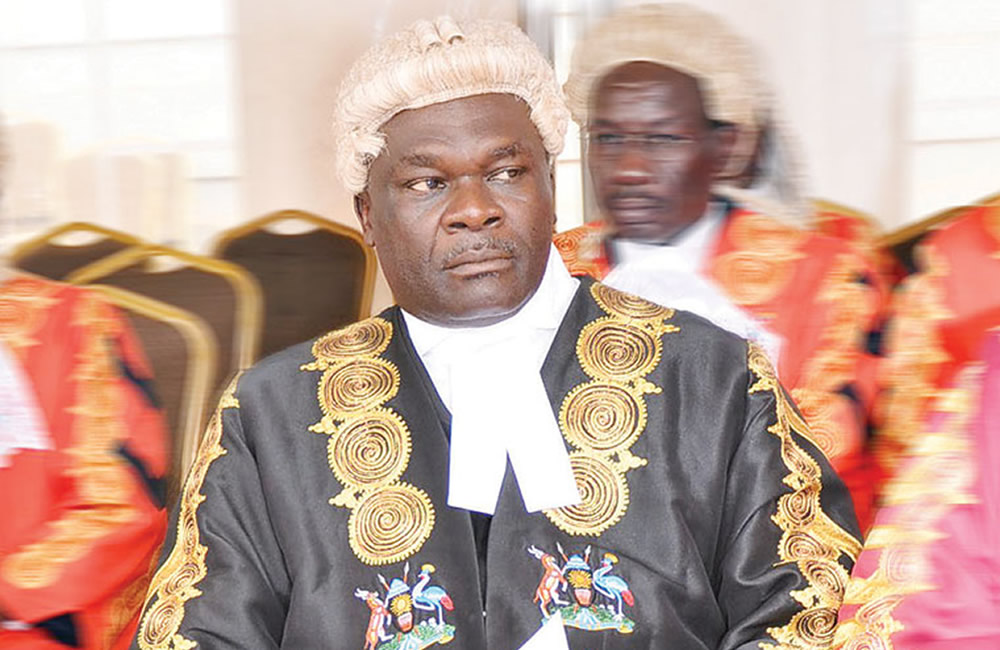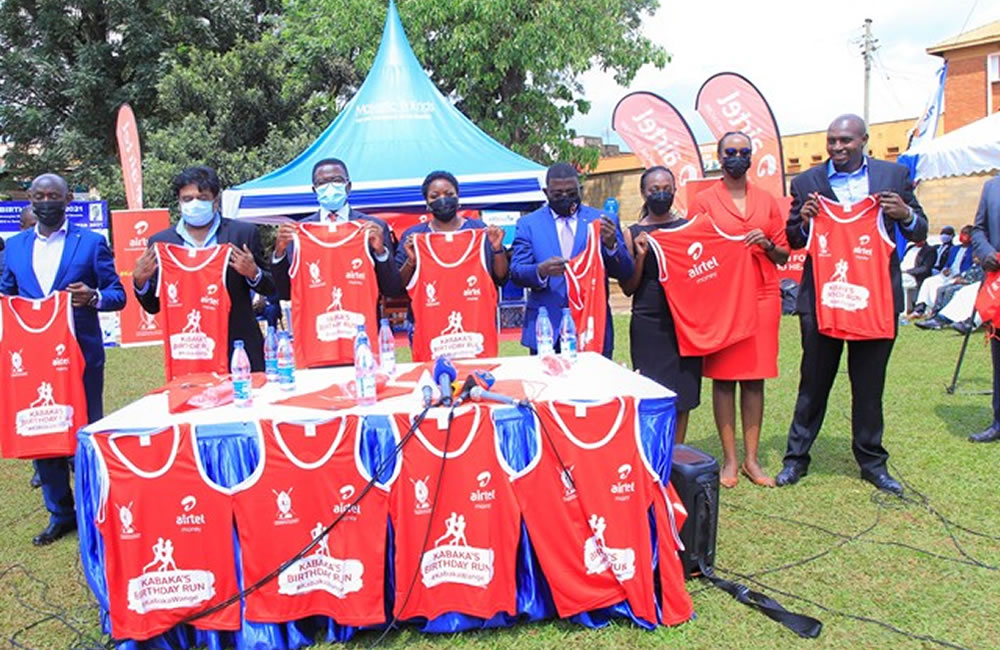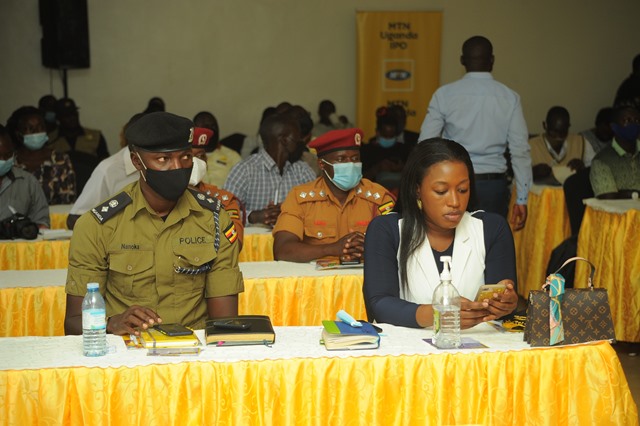Friday May 12 will mark 10 years since Kabaka Ronald Mutebi appointed CHARLES PETER MAYIGA as Buganda katikkiro thereby becoming the Kabaka’s principal advisor and head of the kingdom’s administration. DENIS JJUUKO reflects on Mayiga’s tenure and its milestones.
It is approaching 8 a.m. Even though it is a rainy season, the sun is out early. A car with its headlights on and sirens on is fast approaching the main gate of Bulange, the Buganda kingdom’s administrative headquarters in Mengo. It is a small convoy of SUVs and pickup trucks.
The moment the LandCruiser in the middle enters the gate, a security guard rings a bell. It signals the arrival of the katikkiro, or prime minister. Ringing the bell is a tradition from yonder! It tolls whenever the Katikkiro enters or leaves the Bulange compound.
Anyway, the convoy stops at the main entrance of the imposing Bulange building, built in 1955, seven years before Uganda’s independence. Katikkiro Charles Peter Mayiga steps out of the black SUV. As he walks into the building, he stops to say hello to an elderly woman as onlookers take a photo using their smartphones.
I’m not sure what she is whispering to him. He greets or waves at whoever he finds in the wide wood-panelled foyer or polished wooden floor corridors that lead to his expansive office. Once behind his sizeable wooden table, he removes his jacket as his office assistants help him with tonnes of letters and files that need his attention.
Before he looks at them and immediately after switching on his laptop computer, he reaches for a TV remote. Once the TV is on, he mutes it to attend to his daily chores.
The TV is switched to BBS, the kingdom’s television station. It is one of his key achievements as he marks a decade in office, having been appointed Katikkiro on May 12, 2013, by Kabaka Ronald Muwenda Mutebi. Immediately after his appointment, Mayiga embarked on a kingdom-wide tour to assess the wellbeing of the people and inspire them to fight poverty.
The tour turned into a fundraising drive (Ettoffaali) that raised about Shs 9 billion to help the kingdom solve some of its most immediate challenges. But wherever Mayiga turned up, the people asked him for two things: a television station and a hospital.
Mayiga is pragmatic; so, he started with the easiest one to accomplish — a TV station. The station would be set up in Masengere, a building that had stalled since the ouster of Idi Amin in the 1970s (Bulange had been renamed Republic House and turned into the army’s headquarters).
The building was a constant eyesore and a reminder of the kingdom’s struggles. However, this was not the time for self-pity. Finishing the building was key. It was to give people hope. You can’t inspire people when a building, however gigantic it might be, at your headquarters has harboured reptiles for decades.
But Masengere only came after the completion of a perimeter wall on 64 acres of the Kasubi Royal Tombs. Without a wall, people had started encroaching on these sacred tombs. Three years before his appointment, Muzibu Azaala Mpanga’s main mausoleum at Kasubi, where four of Buganda’s past kings are buried and a UNESCO World Heritage Site, had been burned to the ground. There was a need to restore it.
The work to restore the mausoleum at Kasubi has taken more years than expected, but it is 98 per cent complete, and some sources say it could be handed over during the Kabaka’s 30th coronation anniversary at the end of July this year. Mayiga privately and sometimes publicly says that the work at Kasubi has been the most challenging during his tenure as Katikkiro.
The cultural norms and mores are just too enormous. Regardless, completion is around the corner. Back at Bulange, the kingdom headquarters never had proper corporate governance systems. You hardly knew who worked there officially and who was a visitor.
Most of the workers were volunteers who showed up whenever they wanted. Some are even alleged to have had personal bank accounts disguised as official kingdom ones. He couldn’t develop the kingdom under such circumstances. Mayiga set out to professionalise the operations.
An auditor general’s office was established, as were law chambers, to enable the kingdom to handle its legal issues. Employees got appointment letters, and policies on human resources, finances, volunteers, and procurement, among others, were put in place.
Those who used to wake up to mill around Bulange left bitterly and turned to social media to malign him. Ministers were reduced from about 50 to 12 if you add the Lukiiko (parliament) speaker and his deputy. To ease their work, each got an official vehicle, and they too earned a regular stipend or salary.
The 18 Ssaza chiefs also got official vehicles, and sub-county chiefs were recently given motorcycles. Bulange was also the unofficial headquarters of opposition politicians from Buganda and elsewhere. They used the kingdom’s platforms for selfish political gains. The kingdom paid by being a target of the central government.
Mayiga opened up Bulange to every politician, albeit with one caveat: respecting the institution of the Kabaka. Some opposition politicians paid social media warriors to call him an NRM agent. Meanwhile, some NRM people called him an opposition activist. The peril of being a Katikkiro!
However, that decision eventually endeared him to people from all walks of life, as evidenced by the numbers of people that turn up at kingdom events. The Kabaka Birthday Run attracts 100,000 paying participants. It is perhaps the biggest paid marathon on the continent.
And each year, now in its 10th year, the focus is on a particular health issue. From fistula, sickle cell and HIV/Aids. Kabaka Mutebi is the UNAIDS goodwill ambassador for male engagement. Masaza Cup competitions and coronation anniversaries attract thousands of people.
Buganda doesn’t collect taxes but is expected to deliver services to people. So, income-generating projects had to be prioritised. Buildings like Masengere and others in Makindye and Kasangati were constructed. Houses are being built in Kigo and Ssentema so people can buy them at a affordable prices. Schools like Lubiri Secondary Buloba Campus and the kingdom’s technical institute in Mengo got new gigantic buildings to increase their intake.
Muteesa I Royal University got itself a charter. Kingdoms are revered because they are the custodians of people’s heritage. Five of the six palaces of the Kabaka have been refurbished, and for the first time since the 1966 crisis, the Katikkiro resides in Butikkiro (the official residence in Mengo), having been refurbished.
Clan heads, through their council, are facilitated, and clan ancestral land has been registered in trusts so it can be protected from land grabbers and encroachers.
The goodwill the kingdom has established with the central government has led to the return of more than 200 land titles, which are now under the custody of the Buganda Land Board, from which some lease income is generated.
But first, it was to enable people to get leasehold land titles through the popular Ekyapa mu Ngalo campaign. Many people unsure of their tenancy responded and registered their interests in 49-year leaseholds, including those at the forefront of decampaigning it publicly.
With increased resources, the kingdom is now capable of providing services to people, such as Emmwanyi Terimba (growing coffee programme), which has seen the country significantly increase its coffee exports over the last few years.
Just last week, Mayiga launched the start of building at least one hospital (at the level of a health centre IV) in each of the 18 counties, starting with Ssingo.
Blood bank managers say they collect more units of blood from kingdom drives than anywhere else. When the ministry of Health needed people to vaccinate against Covid-19, they turned to Mengo. Bulange was filled to the brim for days by people who had been previously sceptical of the efficacy of the vaccines.
Savings and credit cooperatives have been started where women and young people save and borrow at low interest rates while at the same time providing market opportunities through trade shows. Others have returned to their villages to get involved in agriculture rather than loitering in the city searching for elusive jobs.
And because they make money and appreciate the work being done, they have given some of it back to the kingdom through Luwalo Lwaffe (our responsibility), where more than Shs 2 billion has been raised.
Buganda may not be where it needs to be, but in the last 10 years of Katikkiro Mayiga’s tenure, there have been some tangible results achieved by building on what his predecessors had previously done.
As he marks his 10th anniversary, his tenure is a true reflection of the meaning of one of the most endearing titles of the Kabaka —Maaso Moogi, meaning the one with a clear vision.





